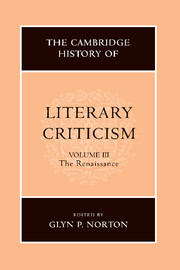Book contents
- Frontmatter
- Introduction
- READING AND INTERPRETATION: AN EMERGING DISCOURSE OF POETICS
- POETICS
- THEORIES OF PROSE FICTION
- CONTEXTS OF CRITICISM: METROPOLITAN CULTURE AND SOCIO-LITERARY ENVIRONMENTS
- VOICES OF DISSENT
- STRUCTURES OF THOUGHT
- 45 Renaissance Neoplatonism
- 46 Cosmography and poetics
- 47 Natural philosophy and the ‘new science’
- 48 Stoicism and Epicureanism: philosophical revival and literary repercussions
- 49 Calvinism and post-Tridentine developments
- 50 Port-Royal and Jansenism
- NEOCLASSICAL ISSUES: BEAUTY, JUDGEMENT, PERSUASION, POLEMICS
- A SURVEY OF NATIONAL DEVELOPMENTS
- Bibliography
- Index
- References
48 - Stoicism and Epicureanism: philosophical revival and literary repercussions
from STRUCTURES OF THOUGHT
Published online by Cambridge University Press: 28 March 2008
- Frontmatter
- Introduction
- READING AND INTERPRETATION: AN EMERGING DISCOURSE OF POETICS
- POETICS
- THEORIES OF PROSE FICTION
- CONTEXTS OF CRITICISM: METROPOLITAN CULTURE AND SOCIO-LITERARY ENVIRONMENTS
- VOICES OF DISSENT
- STRUCTURES OF THOUGHT
- 45 Renaissance Neoplatonism
- 46 Cosmography and poetics
- 47 Natural philosophy and the ‘new science’
- 48 Stoicism and Epicureanism: philosophical revival and literary repercussions
- 49 Calvinism and post-Tridentine developments
- 50 Port-Royal and Jansenism
- NEOCLASSICAL ISSUES: BEAUTY, JUDGEMENT, PERSUASION, POLEMICS
- A SURVEY OF NATIONAL DEVELOPMENTS
- Bibliography
- Index
- References
Summary
Interest in Stoicism and Epicureanism was rekindled in the early modern era as a result of the intensive study, on the part of humanists, of ancient texts, some of which were works of high literary as well as philosophical merit. For this reason, even though neither of these classical philosophical systems was centrally concerned with literary criticism, their revival had important repercussions on the interpretation of literature and on matters of style.
Stoicism
The main tenets of Stoicism were well known to scholars of the Middle Ages and early Renaissance, above all through the philosophical writings of Seneca. In the 1580s, however, Stoic philosophy began to become much more fashionable – a trend which lasted until the 1660s – due principally to the efforts of the Flemish humanist Justus Lipsius. From his immensely popular De constantia (1584) to his authoritative edition of Seneca (1605), Lipsius presented a comprehensive and attractive account of Stoicism. He saw his mission as both philosophical and literary. On a philosophical level, Lipsius wanted to convince his contemporaries that Stoicism was the philosophy best suited to their needs; he did this by emphasizing the similarities, rather than the differences, between Stoicism and Christianity, and by presenting the often criticized Stoic doctrine of emotionlessness as a feasible and rational response to the political turbulence of the times. In literary terms, Lipsius wanted to reverse the judgement of earlier humanists such as Erasmus, who admired the moral content of Seneca's writings but who, like many ancient critics, regarded his writing as, at times, flat and prone to enigmatic obscurity.
- Type
- Chapter
- Information
- The Cambridge History of Literary Criticism , pp. 458 - 465Publisher: Cambridge University PressPrint publication year: 1999



